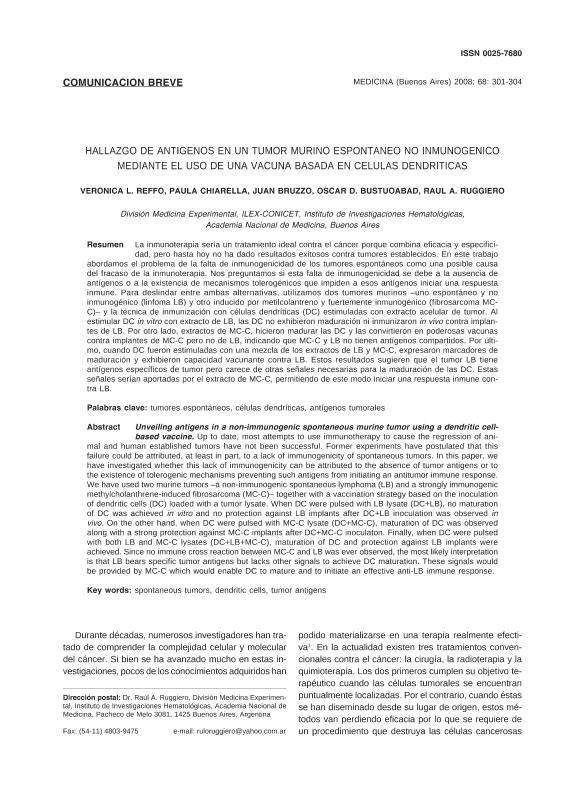Artículo
La inmunoterapia sería un tratamiento ideal contra el cáncer porque combina eficacia y especificidad, pero hasta hoy no ha dado resultados exitosos contra tumores establecidos. En este trabajo abordamos el problema de la falta de inmunogenicidad de los tumores espontáneos como una posible causa del fracaso de la inmunoterapia. Nos preguntamos si esta falta de inmunogenicidad se debe a la ausencia de antígenos o a la existencia de mecanismos tolerogénicos que impiden a esos antígenos iniciar una respuesta inmune. Para deslindar entre ambas alternativas, utilizamos dos tumores murinos -uno espontáneo y no inmunogénico (linfoma LB) y otro inducido por metilcolantreno y fuertemente inmunogénico (fibrosarcoma MC-C)- y la técnica de inmunización con células dendríticas (DC) estimuladas con extracto acelular de tumor. Al estimular DC in vitro con extracto de LB, las DC no exhibieron maduración ni inmunizaron in vivo contra implantes de LB. Por otro lado, extractos de MC-C, hicieron madurar las DC y las convirtieron en poderosas vacunas contra implantes de MC-C pero no de LB, indicando que MC-C y LB no tienen antígenos compartidos. Por último, cuando DC fueron estimuladas con una mezcla de los extractos de LB y MC-C, expresaron marcadores de maduración y exhibieron capacidad vacunante contra LB. Estos resultados sugieren que el tumor LB tiene antígenos específicos de tumor pero carece de otras señales necesarias para la maduración de las DC. Estas señales serían aportadas por el extracto de MC-C, permitiendo de este modo iniciar una respuesta inmune contra LB. Up to date, most attempts to use immunotherapy to cause the regression of animal and human established tumors have not been successful. Former experiments have postulated that this failure could be attributed, at least in part, to a lack of immunogenicity of spontaneous tumors. In this paper, we have investigated whether this lack of immunogenicity can be attributed to the absence of tumor antigens or to the existence of tolerogenic mechanisms preventing such antigens from initiating an antitumor immune response. We have used two murine tumors -a non-immunogenic spontaneous lymphoma (LB) and a strongly immunogenic methylcholanthrene-induced fibrosarcoma (MC-C)- together with a vaccination strategy based on the inoculation of dendritic cells (DC) loaded with a tumor lysate. When DC were pulsed with LB lysate (DC+LB), no maturation of DC was achieved in vitro and no protection against LB implants after DC+LB inoculation was observed in vivo. On the other hand, when DC were pulsed with MC-C lysate (DC+MC-C), maturation of DC was observed along with a strong protection against MC-C implants after DC+MC-C inoculaton. Finally, when DC were pulsed with both LB and MC-C lysates (DC+LB+MC-C), maturation of DC and protection against LB implants were achieved. Since no immune cross reaction between MC-C and LB was ever observed, the most likely interpretation is that LB bears specific tumor antigens but lacks other signals to achieve DC maturation. These signals would be provided by MC-C which would enable DC to mature and to initiate an effective anti-LB immune response.
Hallazgo de antígenos en un tumor murino espontáneo no inmunogénico mediante el uso de una vacuna basada en células dendríticas
Título:
Unveiling antigens in a non-immunogenic spontaneous murine tumor using a dendritic cell based vaccine
Reffo, Verónica; Chiarella, Paula ; Bruzzo Iraola, Juan
; Bruzzo Iraola, Juan ; Bustuoabad, Oscar David
; Bustuoabad, Oscar David ; Ruggiero, Raul Alejandro
; Ruggiero, Raul Alejandro
 ; Bruzzo Iraola, Juan
; Bruzzo Iraola, Juan ; Bustuoabad, Oscar David
; Bustuoabad, Oscar David ; Ruggiero, Raul Alejandro
; Ruggiero, Raul Alejandro
Fecha de publicación:
11/2008
Editorial:
Medicina (Buenos Aires)
Revista:
Medicina (Buenos Aires)
ISSN:
0025-7680
e-ISSN:
1669-9106
Idioma:
Español
Tipo de recurso:
Artículo publicado
Clasificación temática:
Resumen
Archivos asociados
Licencia
Identificadores
Colecciones
Articulos(IMEX)
Articulos de INST.DE MEDICINA EXPERIMENTAL
Articulos de INST.DE MEDICINA EXPERIMENTAL
Citación
Reffo, Verónica; Chiarella, Paula; Bruzzo Iraola, Juan; Bustuoabad, Oscar David; Ruggiero, Raul Alejandro; Hallazgo de antígenos en un tumor murino espontáneo no inmunogénico mediante el uso de una vacuna basada en células dendríticas; Medicina (Buenos Aires); Medicina (Buenos Aires); 68; 4; 11-2008; 301-304
Compartir
Items relacionados
Mostrando titulos relacionados por título, autor y tema.
-
Alvarado, Cecilia Viviana ; Micenmacher, Sabrina Mariel ; Ruiz Grecco, Marina ; Rubio, Maria Fernanda ; Fernandez Larrosa, Pablo Nicolas ; Costas, Monica Alejandra (Medicina (buenos Aires), 2011-01)
-
Polo, Maria Laura ; Riggio, Marina ; May, Maria ; Rodriguez, Maria Jimena ; Perrone, Maria Cecilia ; Stallings Mann, Melody; Kaen, Diego; Frost, Marlene; Goetz, Mattheu; Boughey, Judy; Lanari, Claudia Lee Malvina ; Radisky, Derek; Novaro, Virginia (Impact Journals, 2015-06-08)
-
Vulcano, Marisa ; Sales, Maria Elena ; Lombardi, Maria Gabriela (Hindawi Publishing Corporation, 2013-10)



